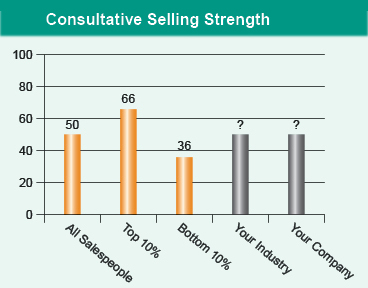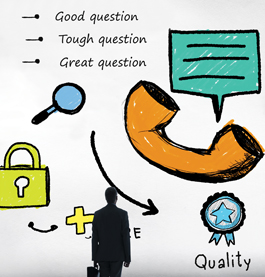Yesterday, a sales manager I was coaching asked me to explain the difference between a great question and a tough question. I gave him the one-minute version but this article has the expanded version of that answer.
I’ll use my world as an example and ask you to translate accordingly.
In my world, while I might occasionally be on a first call with a senior sales leader, I am most frequently speaking with the CEO. With CEOs, the most-common issue they articulate is “I’m not sure we have the right sales leader.”
We have three levels of questions and it’s important to understand that you must be patient enough to ask them in the proper sequence, and not one right after another. This is the proper sequence:
- Good question.
- Tough question.
- Great question.
There should probably be a few questions and answers between your good question and your tough question. There should probably be a few more question and answers between your tough question and your great question. If you don’t get as far as asking and getting the answer to your great question, I can promise you this:
- You didn’t get to the compelling reason they would buy.
- You didn’t get to the compelling reason they would buy from you.
- You didn’t differentiate yourself from the competition.
- You didn’t get your prospect emotional.
- You won’t be able to quantify and/or monetize the impact of the problem.
- You may not get the business.
So let’s start at the beginning, where we heard “I’m not sure we have the right sales leader.”
A good question could be “Why are you concerned?” A good question not only allows you to ask for more information, but it must also be relevant to the discussion at hand.
Several questions later, after hearing the CEO’s concerns and getting much-needed clarification, a tough question might be “With all of these concerns, and him not responding to your challenges to step it up and make the requested changes, why is he still here?” A tough question is usually one where, as with this example, you challenge your prospect. You could also push back against what was said in an effort to change outdated thinking or an incorrect assumption.
Several minutes later, after additional conversation, questions and clarification, the CEO says “He’s my son-in-law — that’s why he’s still here.” Now it’s time for a great question. A great question might sound something like “So, even if you found the perfect replacement, the challenge for you is how do you replace your son-in-law as the sales leader without ruining the relationship you have with your daughter?” You’ll know it’s a great question because your prospect will say, “Great question.”
The three levels of questions, the sequence and your ability to go wider and deeper are examples of the consultative approach to selling. The consultative selling competency is by far, the one where most salespeople are the weakest. Our latest statistics, from the evaluations and assessments of around 1.6-million salespeople, show the following:
- Only 35 percent of all salespeople have consultative seller as a strength.
- The top 10 percent have an average score of only 66
- The bottom 10 percent have an average score of just 36
- The average score for all salespeople is just 50.

The average salesperson has only 50 percent of the necessary attributes of the consultative seller competency which means that they are lousy at the consultative approach.
There are four reasons why salespeople are so inherently bad at this:
- They need to be liked and they won’t ask a question if they think the prospect will get upset with them for asking.
- Good questioning requires good listening skills and the only thing most salespeople are good at listening to is the sound of their own voice.
- Most salespeople have never been trained or coached to sell consultatively.
- Most salespeople are best at presenting and can’t wait long enough for the opportunity to present.
MANA welcomes your comments on this article. Write to us at [email protected].


